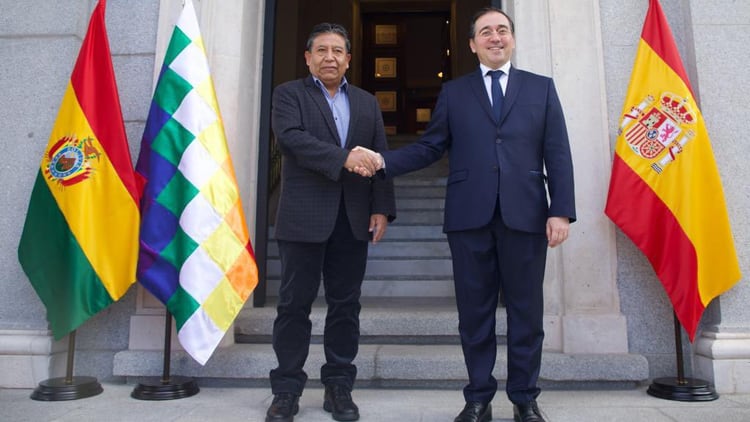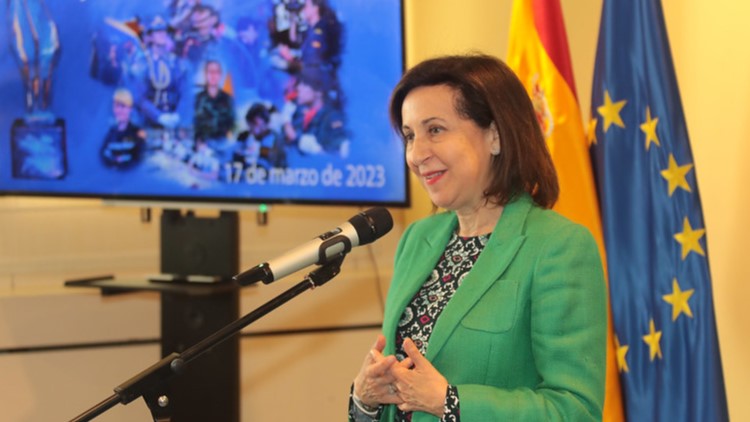The Diplomat
The Vice-President of Bolivia, David Choquehuanca, yesterday asked the Minister of Foreign Affairs, José Manuel Albares, that Spain, during its Presidency of the European Union, should push for the Schengen visa exemption for Bolivian citizens travelling to countries in the area, according to diplomatic sources.
Juan Carlos Alurralde, Secretary General of the Vice-Presidency, who accompanied Choquehuanca on his visit to our country, said: “Spain holds the Presidency of the European Union this year, and in that capacity they have mentioned to us that they are going to take steps to discuss the issue of Schengen visa exemption for Bolivian citizens, and that they are committed to doing everything necessary in terms of the procedures that obviously exist within the European Union,” reported the newspaper Oxígeno.bo.
The abolition of short-stay visas to access the Schengen area is a long-standing aspiration of Bolivia, which already raised it with Spain in 2016, after the EU Justice and Home Affairs ministers in 2007 imposed the need for Bolivians to have a visa, in view of the increased migratory pressure from the Andean country resulting from the fact that many Latin Americans who were asked for a visa fraudulently obtained a Bolivian passport in order to avoid it.
It is precisely these cases of fraud that are still holding up the abolition of the Schengen visa for Ecuadorians, who have also been requesting for many years that the same treatment be applied to them as has been applied to Peruvians and Colombians since 2016.
On the other hand, during his meeting with Choquehuanca, according to Juan Carlos Alurralde, the Spanish Foreign Minister reiterated his invitation to the President of Bolivia, Luis Arce, to make an official visit to Spain, although it is foreseeable that beforehand, on the occasion of the Ibero-American Summit next weekend in Santo Domingo, there may be some high-level contact.
The Secretary General of the Bolivian Vice-Presidency added that in the meeting with Albares, they also discussed “giving impetus to and strengthening the agenda of the meeting between the EU and CELAC, which will take place on 17 and 18 July in Brussels, during the Spanish Presidency of the European Council.
Alurralde also stressed that the minister expressed his appreciation for the Bolivian community that resides in Spanish territory and contributes to the development of the country. “They have absolutely no problem in this aspect, that is to say that there is a migratory exchange with Bolivia,” he said, before stressing that the Spanish have admiration “for the work of the Bolivians”.
Finally, the Secretary General underlined the “excellent relations that exist with Spain”, something that Albares himself also noted on his Twitter account.
Relations between Spain and Bolivia suffered a serious deterioration in 2019 and 2020, during the year in which Jeanine Áñez occupied the Presidency of the country, following the political crisis resulting from the departure of Evo Morales. For many months, the embassies in Madrid and La Paz were without an ambassador, after the Bolivian authorities expelled two Spanish diplomats in December 2019 following an incident at the residence of the Mexican ambassador in Bolivia.
Last Thursday, Choquehuanca presented his “La geopolítica del bien vivir” at Casa de América, on a stop on his trip to Vienna, where he defended the decriminalisation of the coca leaf, which has remained on the UN list of narcotics for 60 years.
The Bolivian vice-president said that Spain has supported his country in achieving the decriminalisation of coca chewing and assured that he is not “a radical indigenist”, “In Spain we feel good”, he said, adding that “we always have to listen to each other”.







